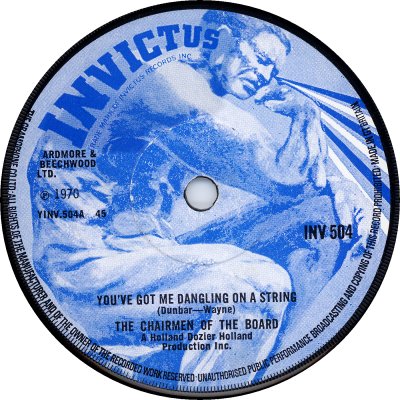
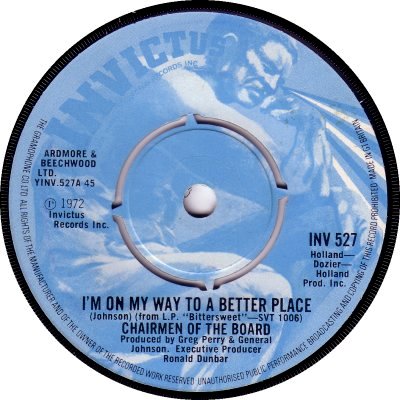
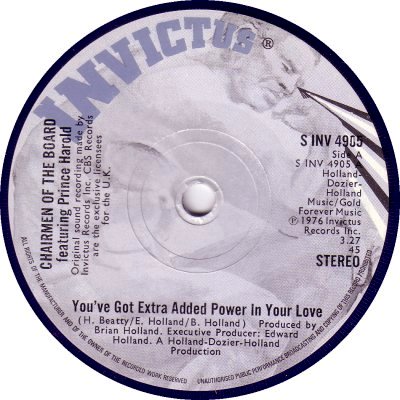
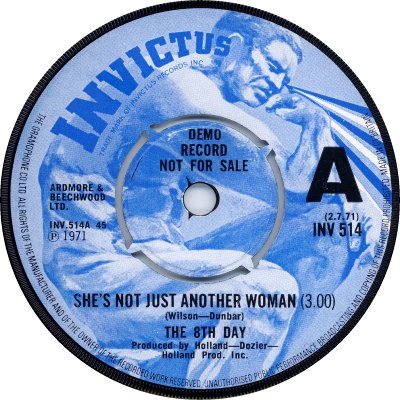
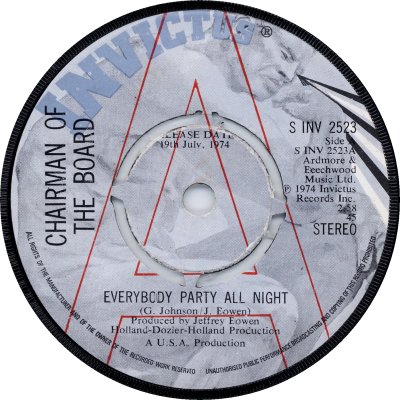
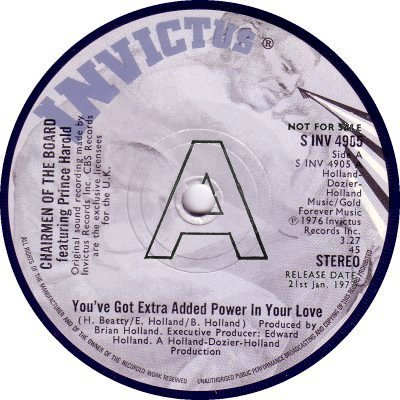
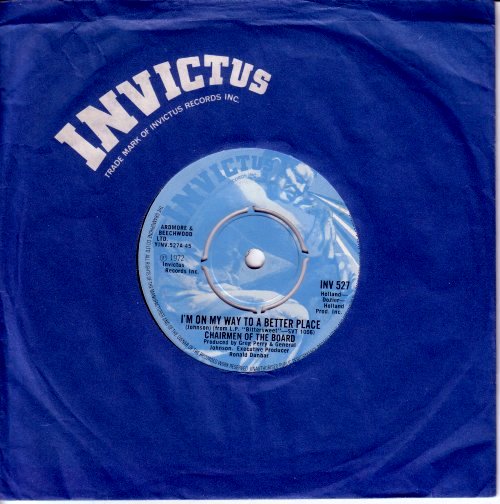
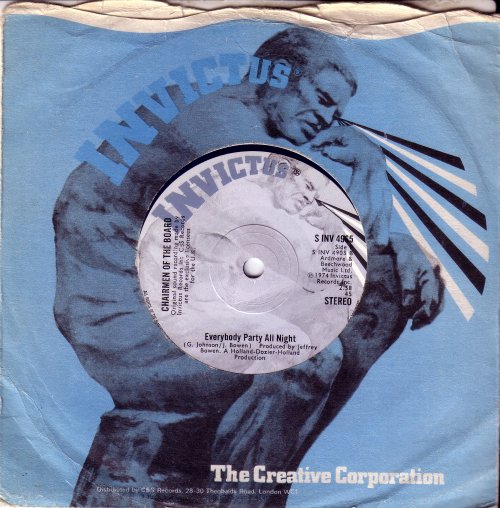
American, out of Detroit, Michigan. Invictus was one of a pair of labels started by Eddie Holland, of the legendary songwriting team Holland-Dozier-Holland, after the trio left Motown, the other being Hot Wax (q.v.). Invictus was described as 'Newly formed' in Billboard of the 24th of May 1969; the article said that it was owned by Holland and that it had signed an agreement with Capitol for pressing, distribution and marketing in the USA. 'BB' of the 7th of June added that in return for financially underwriting Invictus Capitol was to receive an 'unlimited' amount of material from the new label under a three-year deal signed with parent company Holland-Dozier-Holland Productions. For some reason Invictus's sister-label Hot Wax was placed with Buddah rather than Capitol.
Invictus made a promising start, hitting the Hot 100 several times with Freda Payne and Chairmen Of The Board and also scoring in the dedicated Soul charts. An advert in 'BB' of the 24th of April carried the proud boast the 95% of the label's singles had made the Charts, while a few months later 'BB' of the 23rd of October 1971 noted that Invictus records were occupying 10% of the Soul chart places. 1972 however was relatively poor; possibly as a consequence 'BB' of the 10th of February 1973 claimed that the company was considering changing distributors and had been in talks with ABC. A move took place, but it was not to ABC - Invictus switched to CBS / Epic, as reported by 'BB' of the 7th of April. A couple of years later 'BB' of the 16th of August 1975 reported that Capitol had loaned Invictus between $1.5 million and $2 million in a deal that was described as only 'fairly successful', and that after 'personality conflicts' incoming Capitol president Bhaskar Menon had written off the remaining debt.
All was not well at Invictus, even after the move. There were serious internal wranglings: 'BB' of the 29th of June 1974 broke the news that Lamont Dozier was suing the Hollands, claiming that they had used fraudulent misrepresentation in order to persuade him to enter into a contract with Holland-Dozier-Holland Productions in May 1969. According to him he had received neither accounts nor the money that was owing to him. Perhaps as a result of the distractions there were only two Invictus singles issued in the States in 1975 and none at all in the UK. When releases started coming out again, in the summer of 1976, they were few and far between, and there were none after the summer of 1977. 'BB' of the 30th of September 1978 revealed that Kenneth Jackson, who had previously been general manager at Invictus and Hot Wax, had taken a job elsewhere, which doesn't sound as though he was optimistic about either label's future. According to Billboard of the 2nd October 1982 Invictus remained involved in legal wrangles into the early '80s. In 1984 the Holland brothers set up a new company, H-D-H Records, which began to reissue material from the Invictus and Hot Wax catalogues.
In Britain Invictus and Hot Wax were launched in 1970, the year after they made their debut in the States. Both joined the EMI stable; 'Record Retailer' of the 11th of July 1970 said that they would be launched under their own logos 'in the next few weeks'. In the event Invictus charged out of the starting blocks here, hitting the Charts with its first two singles. 'Give Me Just A little More Time' b/w 'Since The Days Of Pigtails' by Chairmen Of The Board (INV-501; 8/70) made the No.3 spot, and Freda Payne's 'Band Of Gold' b/w 'The Easiest Way to Fall' (INV-502; 8/70) improved on that, giving the company its solitary No.1 - both singles had already been hits on the other side of the Atlantic. The Chairmen's follow-up 'You've Got Me Dangling On A String' b/w 'Patches' (INV-504; 11/70) peaked at No.5, 'Everything's Tuesday' b/w 'Bless You' (INV-507; 2/71) reached a respectable No.12, and several more of the band's singles managed lesser placings in the Top 50 between 1971 and 1973. Payne managed a couple of lesser hits, but the only Chart action for Invictus after 1971 came in the shape of a single by Holland-Dozier, 'Why Can't We Be Lovers' b/w 'Don't Leave Me' (INV-525; 10/72).
Five months or so after the American switch from Captiol to Columbia, Invictus signed a distribution deal with CBS for Britain, as reported in 'Music Week' of the 22nd September 1973. The Hot Wax label was discontinued, as had happened in America. Despite the report in 'MW' no records were issued at the time, and it was not until July of the following year that the first Invictus singles appeared under the deal; 'MW' of the 27th of that month observed that the release had taken place. Catalogue numbers changed from EMI's INV-500 series: they retained the 'INV' prefix but the new four-number numerical part was taken from the main CBS series. After a mere four singles had been issued, all of them in 1974, there was a break, presumably reflecting the parent label's problems in America. Invictus made a comeback in 1976-77 but it proved to be a brief one and yielded only another four singles. None of the CBS-era releases made the Charts.
One basic label design served Invictus throughout. EMI issues had mid-blue labels (1); the level of contrast between the dark and light areas dropped in the middle of 1972 (2). There was a blue company sleeve (7). The label colour became grey-blue with the move to CBS; in addition the size and position of the credits changed (3) and a new company sleeve was introduced (8). EMI demos were marked in the usual EMI fashion (4); CBS ones usually had a large hollow 'A' either in red (5) or in black, but one single had a medium-sized 'A' instead (6). All three types were used by CBS elsewhere at the time. Thanks to Bob Mayhead for discographical information.
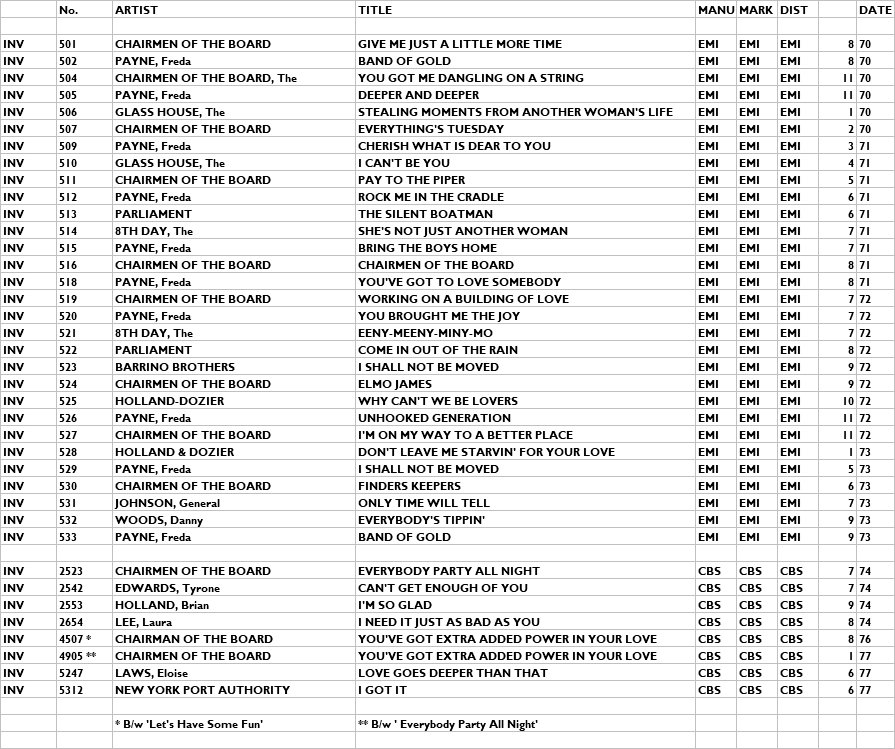


Copyright 2006 Robert Lyons.

